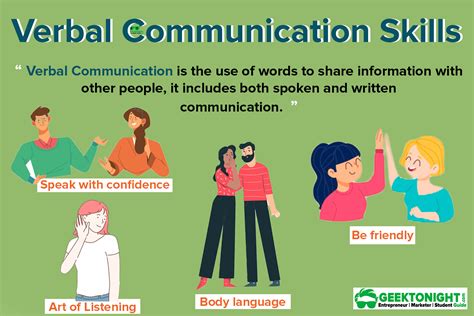Verbal Communication Skills List And Examples

Effective communication is the cornerstone of success in both personal and professional life. Verbal communication is a vital component of communication and involves the use of words to convey a message or idea. It is important to have strong verbal communication skills to be able to articulate your thoughts and ideas clearly and concisely. In this article, we will discuss the essential verbal communication skills, their importance and how to improve them.
1. Active Listening
Active listening is the ability to fully concentrate on what the other person is saying and understanding their message. It involves maintaining eye contact, asking clarifying questions, and paraphrasing to ensure you have understood the message accurately. Active listening is an essential skill in effective communication as it allows you to build trust and understanding with the other person.
2. Clarity and Concision
Being clear and concise in your communication is important to avoid misunderstandings and confusion. It involves using simple language, avoiding jargon, and getting straight to the point. Clarity and concision help to keep the conversation focused and ensure that the message is received accurately.
3. Confidence
Confidence is important in verbal communication as it helps to convey authority and credibility. Speaking with confidence involves having a clear and steady voice, maintaining eye contact, and using appropriate body language. Confidence helps to build trust and respect with the listener and encourages them to listen attentively to your message.
4. Empathy
Empathy is the ability to understand and relate to the emotions and feelings of the other person. It involves actively listening to their concerns and expressing understanding and support. Empathy is an important skill in verbal communication as it helps to build trust and respect with the listener and encourages them to open up and share more.
5. Flexibility
Flexibility involves adapting your communication style to suit the needs and preferences of the listener. It involves using appropriate language, tone, and style to ensure that the message is received clearly. Flexibility helps to build rapport with the listener and ensures that the message is received accurately.
6. Humor
Humor can be used in verbal communication to lighten the mood and build rapport with the listener. It involves using appropriate jokes, anecdotes, and stories to engage the listener and make them feel comfortable. Humor helps to create a positive and relaxed environment and can make the listener more receptive to the message.
7. Open-Mindedness
Open-mindedness is the ability to consider alternative perspectives and ideas. It involves being receptive to feedback and criticism and being willing to adapt your communication style to suit the needs of the listener. Open-mindedness helps to build trust and respect with the listener and encourages them to share their ideas and perspectives.
8. Patience
Patience is important in verbal communication as it involves being able to listen attentively and waiting for the other person to finish speaking. It involves resisting the urge to interrupt or interject and allowing the other person to express their thoughts and ideas fully. Patience helps to build trust and respect with the listener and encourages them to share more.
9. Positivity
Positivity involves maintaining a positive and optimistic attitude in verbal communication. It involves using positive language, expressing enthusiasm and appreciation, and avoiding negative language and criticism. Positivity helps to create a positive and rewarding environment that encourages the listener to engage more actively.
10. Reflection
Reflection involves taking time to consider your communication style and identifying areas for improvement. It involves seeking feedback from others and being willing to make changes to improve your communication skills. Reflection helps to improve your communication skills and ensures that the message is received accurately.
Conclusion
Verbal communication is a vital component of effective communication. The essential verbal communication skills include active listening, clarity and concision, confidence, empathy, flexibility, humor, open-mindedness, patience, positivity, and reflection. Developing these skills can help you to become a more effective communicator and build better relationships with others.
FAQs
1. What are the benefits of verbal communication skills?
Verbal communication skills can help to improve your relationships with others, build trust and respect, convey your message accurately, and facilitate better collaboration and teamwork.
2. How can I improve my verbal communication skills?
You can improve your verbal communication skills by practicing active listening, focusing on clarity and concision, maintaining confidence, showing empathy, being flexible, using humor, being open-minded, practicing patience, maintaining positivity, and reflecting on your communication style.
3. What are some common barriers to effective verbal communication?
Some common barriers to effective verbal communication include language barriers, cultural differences, distractions, technical jargon, and lack of attention or interest.
4. What is the importance of body language in verbal communication?
Body language can convey important nonverbal cues such as facial expressions, tone of voice, and gestures that can enhance or detract from the verbal message being conveyed. It is important to be aware of your body language and use it effectively in verbal communication.
